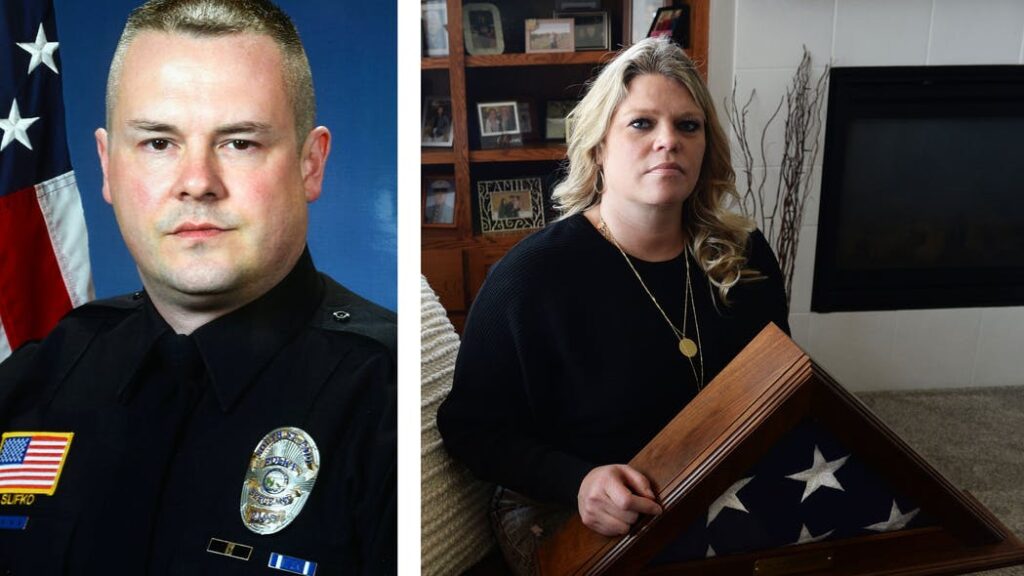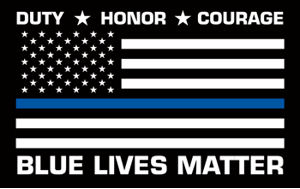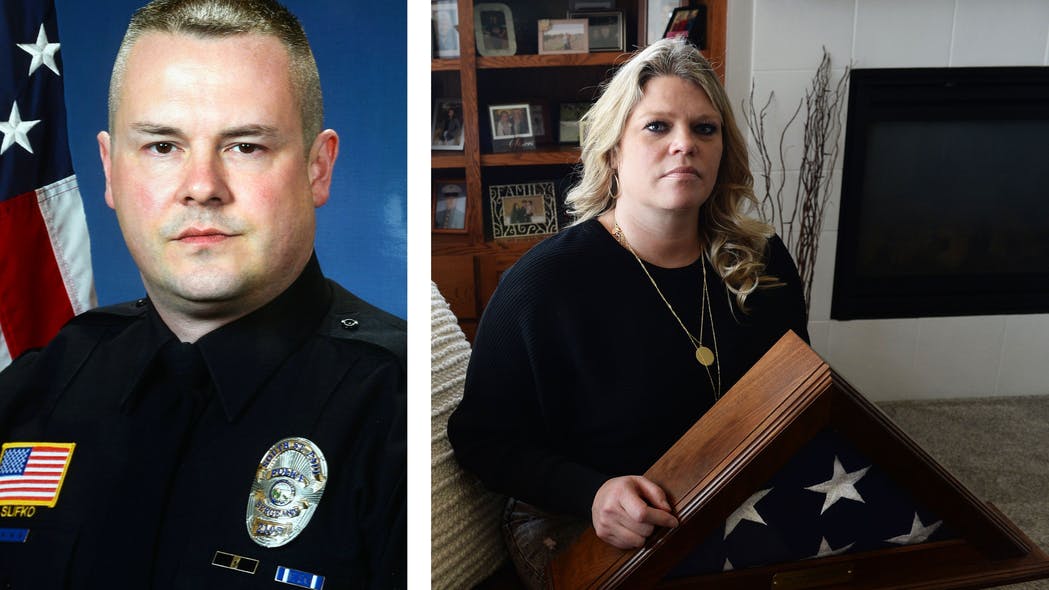“This job was his life. … But over the years, it took a toll on him,” said the widow of South St. Paul Police Officer Cory Slifko, who died by suicide in 2019 after being diagnosed with post-traumatic stress disorder.
By Dave Orrick Source Pioneer Press
ST. PAUL, MN—When Cory Slifko died in 2019, Katie Slifko lost her husband and the father of their two children and instantly became a member of a dreaded group: widow of fallen officer.

Except not quite.
South St. Paul Police Officer Cory Slifko’s death isn’t recognized as in the line of duty, so many of the honors and benefits afforded surviving spouses don’t go to Katie, or their two children.
That’s because Cory Slifko died by suicide.
In both federal and state statutes and rules, if an officer causes their own death, certain benefits, including some lump-sum payments and health insurance for surviving children, are excluded.
“There’s a general stigma behind it and how it’s treated,” Katie Slifko said in a recent interview. “He’s not given the honor of a work-related death. It makes me feel like his years of service aren’t recognized. All those years where we sacrificed with him, when he worked late, and when he missed family occasions, things with the kids.”
Katie has no doubt that even though Slifko died not in a shootout, but alone in his bedroom, the job killed him. He had been diagnosed by multiple doctors with post-traumatic stress disorder stemming from his work as a cop.
Proposals in Congress and the Minnesota Capitol seek to change the suicide exclusion for people like the Slifkos by redefining suicide by officers diagnosed with PTSD as no different than if they were gunned down by the hand of another — or if they suffered a heart attack or stroke from job-related stress.
The bipartisan bills signify a national change in sensibilities as the public becomes increasingly aware of the trauma officers and first responders face, whether from grappling against a riotous mob, or performing the day-in, day-out duties that include frequent threats of violence and exposure to gruesome scenes not easily forgotten when the shift ends.
‘In the line of duty’
Following widespread attention of suicides by soldiers returning from deployments in Iraq and Afghanistan, the U.S. military now classifies an estimated 90 percent of suicides as line-of-duty deaths. But that’s not the case for local peace officers and other first responders because laws and regulations affecting their deaths haven’t changed, and across the nation, those rules specifically exclude suicides from line-of-duty deaths.
“If you’re a soldier, you could come back from one deployment and have PTSD, but if you’re a career law enforcement officer, it could be a single incident, or it could be all that you see over the course of your career,” said state Sen. Zach Duckworth, R-Lakeville.
Duckworth is a member of the Minnesota Army National Guard whose deployments included serving in Kuwait during the Iraq war, as well as during the riots following the murder of George Floyd and being stationed at the Brooklyn Center Police Department after the police killing of Daunte Wright. Duckworth said he’s known veterans who have suffered from PTSD and died by suicide, and he’s the lead sponsor on a bill in the state Senate to explicitly include suicides by public safety officers as line-of-duty deaths if a mental health provider has diagnosed PTSD from work.
A bill in Congress would similarly change federal law, creating a presumption that a public safety officer suffering from PTSD who dies by suicide is killed in the line of duty. That bill also would make officers diagnosed with PTSD eligible for permanent disability, just like if they had on-the-job physical injuries.
“PTSD can be just as debilitating as physical injuries,” said U.S. Rep. Angie Craig, D-Minn., who is supporting the bill in the U.S. House. “This is a recognition that certain jobs in certain careers have a tough mental health aspect to them. It’s also about a woman and her children who have gone through one of the worst experiences imaginable, and they’ve come out on the other side without the benefits that Cory earned in 20 years of service.”
Sgt. Cory Slifko
There’s a stereotype that cops don’t talk about work when they get home. That wasn’t the case for Cory Slifko, said Katie, who began dating Cory when she was still a teen. Eventually, they settled in Farmington.
“Cory and I talked a lot,” she said. “We talked every day about how the day went, so I knew when things went well and when they didn’t. So I know about the traumatic events he had. He was open about those as well.”
An ambitious officer, Slifko moved up in his assignments with the South St. Paul Police Department, from working night patrols to heading up investigations. Over the course of a 20-year career, he worked on the county SWAT unit as an assistant commander and a domestic abuse response team, eventually reaching the rank of sergeant overseeing other officers.
“This job was his life,” Katie said. “He loved it, and he wanted to be the best. But over the years, it took a toll on him between chronic pain and other events. They said cops see things in one day that the rest of us might see in a lifetime, but you’re meant to shake it off and go to the next call.”
The troubling stories Cory would tell Katie after his shift were frequent. There was a deadly fire, and Cory was assigned to stay with the bodies while firefighters battled the blaze and mopped up. There were autopsies of children he watched during homicide investigations. He pulled crash victims from vehicles if he was first on the scene; sometimes they were badly injured. A woman died by suicide and Cory’s gruesome role was collecting her remains. He was in standoffs with the SWAT team, encounters that felt like they could turn into deadly firefights at any moment. On more than one occasion, he was part of teams that found bodies in the Mississippi River.
Over time, Katie said, he suffered from lack of sleep and irritability, and both problems gradually and steadily grew.
“It wasn’t one incident, but multiple incidents.”
In 2013, Cory Slifko was arrested in a morning DWI in Rosemount in which he struck mailboxes before an officer rammed his SUV to stop it. He was wearing pajamas, didn’t have his wallet, and in addition to a blood alcohol level that registered 0.175, he had taken a large amount of sleep medication, according to Katie Slifko and fellow officers who discussed the incident on an episode of the “Officer Down” podcast. Cory Slifko, who was charged with driving while impaired and fleeing a police officer, told them he didn’t remember the incident.
After being placed on leave, he ultimately returned to duty. During a burglary call inside a darkened industrial building in 2015, Slifko fell into an oil change pit that hadn’t been cordoned off, suffering head and neck injuries and numerous broken bones. He required repeated surgeries.
“He was never the same after that,” Katie said, referring to the physical pain he chronically suffered. Migraine headaches led him to sleep for days at a time. “I feel like this job took my best friend.”
Back in 2013, Slifko was diagnosed with PTSD by a psychiatrist, as well as a team of providers at the Mayo Clinic, and he was seeking a specific type of therapy for PTSD.
The couple had spoken about suicide; officers have higher suicide rates than the general public, and PTSD has been known to increase the risk in first responders for decades. Cory had promised Katie that he wouldn’t do it.
But on Nov. 5, 2019, Katie, a nurse practitioner, came home and discovered his body. Both their children — an 11-year-old daughter and 14-year-old son at the time — were home. The son initially made the 911 call, explaining his mother was distraught, and that he believed his father, a police officer with PTSD, had killed himself, and that he was scared.
‘Revictimizing us’
After Cory died, as Katie Slifko began to navigate the bureaucracy a surviving spouse faces, she quickly realized how differently she and the children would be treated. The myriad benefits available — or not — are complicated, but the difference between an officer who dies by suicide — or not — can amount to hundreds of thousands of dollars, when you include federal and state payments from dedicated funds, workers’ compensation, health insurance and private life insurance policies.
When some claims were denied, she fought back, hiring a lawyer. At least one case is pending in a state proceeding. Fighting the claims has led to her being questioned by attorneys who ask probing questions about her personal life, implying Cory’s mental state could be the result of other causes.
“This constant battle that I’m going through right now keeps revictimizing us,” she said. “On top of grieving when we lose your best friend … to now have to fight for everything that I think he deserves.”
Momentum builds
It was the story Katie Slifko’s travails that cast the attention of Minnesota lawmakers on PTSD-related suicides among police officers.
The proposal in St. Paul appears to be receiving growing support among lawmakers in both parties in the House and Senate. However, it faces an uphill climb to become law before the Legislature adjourns in May. Several lawmakers told the Pioneer Press that because the bill was added relatively late in the session, it hasn’t had a chance to be vetted as most bills are. For example, no one has analyzed how much it would cost taxpayers to remove suicide exclusions.
The bill in Congress, however, is more mature. Federal lawmakers were confronted with the issue in the days following the Jan. 6, 2021, attack on the U.S. Capitol by supporters of then-President Donald Trump. Five people died in the attack or days following, including three police officers — two of whom died by suicide. Many of the very lawmakers who felt they owed their lives to the officers were aghast to learn of suicide exclusions.
While there appears to be no one central source for police suicides, a fact-finding team reported there were 240 public safety officers who died by suicide in 2017 and whose families were not eligible for a Department of Justice payment that would have been about $344,000 each.
The bill in Congress also has bipartisan support in both chambers, although when it might advance remains unclear.
In March 2021, a Washington, D.C., police retirement board decided to declare one of the Jan. 6 officers who died by suicide to have been killed in the line of duty. It was believed to one of the first times in the nation’s history that such an act had been taken.
By August, the number of officers defending the Capitol who had died by suicide had grown to four.
©2022 MediaNews Group, Inc.
Visit at twincities.com.
Distributed by Tribune Content Agency, LLC.

